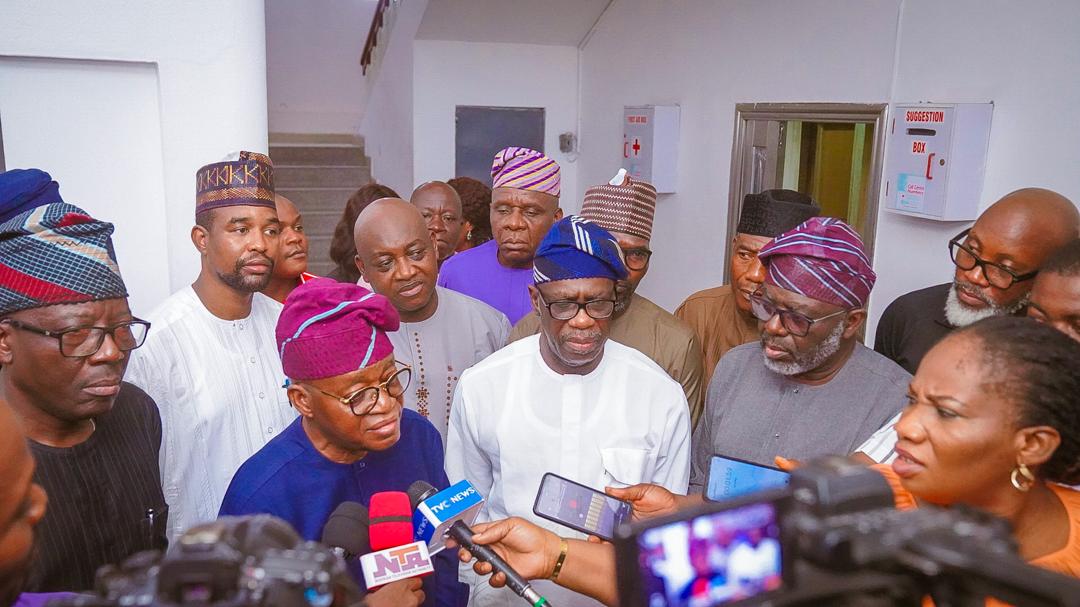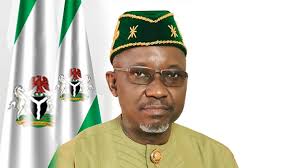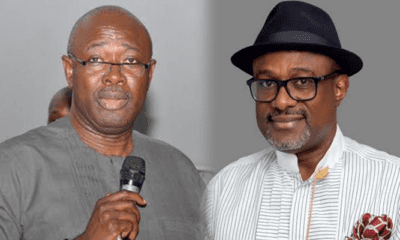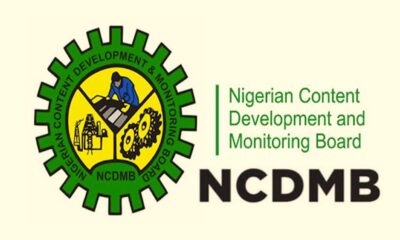Business
NCDMB, Waltersmith Refinery partner on graduate retraining
A 12-month Nigerian Content NC-Remedial Training Programme for young university graduates kicked off on Friday in Port Harcourt, Rivers State, with 29 trainees expected to focus on general skill sets and specialised skill sets that would fit them for oil and gas industry operations.
Organised by the Nigerian Content Development and Monitoring Board (NCDMB), in conjunction with Waltersmith Refining and Petrochemical Company Limited, the programme would introduce the participants to Entrepreneurship, Health Safety at Work, Information and Communication Technology (ICT), and Engineering Materials, under the general skill sets. These are compulsory for all the trainees.
Specialised skill sets, where participants are required to concentrate on one or the other of the many competencies available, include Project Management, Scrum Master, Quality Management System ISO 9001:2015, Welding and Fabrication, Mobile Crane Operation, Plumbing and Pipe-fitting, and Mechanical Engineering Designs.
At the kick-off Ceremony at Dexterous Applied Training Institute, Port Harcourt, the Director, Monitoring and Evaluation of NCDMB, Mr. Akintunde Adelana, said the programme is for human capital development which is central to the mandate of the Board, and also for the good of the trainees who need such vital skills to secure employment in the oil and gas industry and to become employers themselves.
“This is the beginning of a new phase in your lives,” he explained to the trainees, noting that “The industry is in need of manpower, but manpower that is skilled.” He urged them to make the best of the opportunity provided, while emphasising that the Board is “going to be tracking [their] progress” and also monitoring the quality of training imparted.
He assured them that they would receive “globally recognised certification” at the end of the programme.
The Director who was represented by Mr. Jeff Tuatuagha, General Manager, Upstream and Monitoring of the NCDMB, commended Waltersmith Refinery for keying meaningfully into the capacity building programme of the NCDMB and for the sound organisation in putting together the current training programme. He was similarly impressed with Dexterous Applied Training Institute for successfully conducting the selection process based on personal data extracted from NCDMB’s Nigerian Oil and Gas Industry Content Joint Qualification System (NOGIC JQS).
The Group Head, External Affairs and Government Relations of Waltersmith, Mrs. Eriye Onagoruwa, echoed the point made by the NCDMB Director on opportunities in the oil and gas industry, noting that “There is a mad hunt for manpower in different sectors of the economy. But you must have the required skills.”
She said “discipline and consistency are vital” to achieve their goals, and that they must eschew entitlement mentality which inclines individuals to believe that they could secure employment simply because of where they come from. “No handovers anymore,” she reiterated, adding that there are no shortcuts either.
On the training scope for the programme, the Assistant Training Officer at Dexterous, Mr. Dumam Abila, said there are two broad categories, namely, professional and vocational. Under the professional category are Procurement and Supply Chain Management, Project Management, Safety Courses, Software Operations, Quality Management Systems, and Engineering.
Vocational courses include Welding and Fabrication, Building and Construction, Lifting and Rigging, Dry Plant Equipment, Maintenance and Operation, and Heavy Duty Equipment Operation.
The Institute’s Chief Training Officer, Engr. O.C. Scott, told the participants that the programme is designed to bridge “the gap between academic training and industry practice,” and encouraged them to approach trainers to discuss whatever challenges they experience at any point.
In response to a question from a trainee, he said hands-on training for some of the courses would be held at operational sites in Port Harcourt and Warri, Delta State, and that accommodation would be provided when the programme takes them to Delta State.
Dexterous is an internationally accredited training provider and a leading member of the Oil and Gas Trainers Association of Nigeria (OGTAN). It is also a City and Guilds Qualification Certification Centre.
Business
Oyetola in Lagos, defies downpour, embarks on inspection tour


By Seun Ibiyemi
The rain in Lagos began very early on Thursday morning. But the torrential rainfall did not stop Minister of Marine and Blue Economy, Adegboyega Oyetola, CON, from embarking on the tour of two key institutions that were recently brought under his ministry — the Nigerian Institute for Oceanography and Marine Research (NIOMR) and the Liaison office of the Department of Fishery and Aquaculture, which houses College of Fishery, Lagos.
His first port of call was NIOMR, where the Chief Executive of the institute, Prof. Abiodun Sule, took the Minister through some of its strategic breakthroughs, including unveiling some of the different species of fish in our waters.
The Minister charged the Institute to take up the challenge of mapping out the country’s various marine resources, saying the country needs to know what it has and in what quantity.
He charged the staff to redouble their efforts and ensure they find a solution to the rising cost of fish feeds in Nigeria. The Minister reiterated his desire to increase local production of fish, while reducing dependence on importation.
From the Institute, Oyetola and his entourage, which included the Permanent Secretary, Oloruntola Olufemi; Director, Maritime Safety and Security, Babatunde Bombata, and the Executive Director, Engineering and Technical Services, Engr. Ibrahim Umar, who represented the the MD of NPA, headed for the Department of Fishery and Aquaculture, where the delegation inspected the Laboratory and charged the staff not to lower the standard of monitoring and inspection so as to ensure the country’s exporters are not blacklisted by the International community and also ensuring that those being imported meet required standard.
He assured the staff of both institutions of his commitment to their welfare, while urging them to also increase their capacity and productivity, as he wants to see the fishing contribute to job creation and increase in revenue of the FG.
The elated members of staff promised the Minister not to let him down and pledged their commitment to the vision and mission of the Minister with respect to the maritime sector.
Business
CPPE urges CBN to halt interest rate tightening, as businesses are yet to recover from previous hikes


The Centre for the Promotion of Public Enterprise (CPPE) has called on the Central Bank of Nigeria (CBN) to slow down on monetary policy tightening ahead of its Monetary Policy Committee (MPC) meeting this month, stating that businesses are yet to recover from the hawkish monetary policy stance in the last two months.
The Centre stated this in its reaction to the latest inflation figures published by the NBS where headline inflation rose to 33.69 percent in the month of April from 33.20 percent in March.
According to the statement signed by the Director-General of the CPPE, Dr Muda Yusuf, monetary policy tools should be paused for the fiscal side of the economy to work towards addressing the supply issues affecting the inflation dynamics in the country.
He stated, “Meanwhile we urge the monetary policy Committee to soften its monetary tightening stance for the time being. Businesses are yet to recover from the shocks of the recent bullish rate hikes. The monetary instruments should be put on pause while fiscal policy tools address supply-side factors in the inflation dynamics.”
Furthermore, the Centre appreciated the slowdown in inflation for the month, especially headline and food inflation, but noted that the main drivers of price hikes (food, transport, insecurity in farming communities and other structural problems) are yet to cool down.
He explained that the drivers of inflation are supply-based and being addressed by the fiscal authorities. Also, Dr. Yusuf doubled down on his call to the Nigerian Customs Service (NCS) to set a quarterly exchange rate between N800 and N1000 for import duties assessment, noting that the continuous fluctuation has a pass-through effect on inflation.
In his words, “Meanwhile the exchange rate benchmark for the computation of import duty continues to be a major concern to businesses as it has become a major inflation driver. We again urge the CBN to peg the rate at between N800 -N1000/dollar to be reviewed quarterly. This is necessary to reduce the pass-through effect of heightening trade costs on inflation.”
Meanwhile, the CPPE also lauded the commencement of refining by the Dangote refinery, stating that it would help slow down inflation in the short term.
Recall that Nigeria’s inflation rate rose to 33.69 percent in April on the back of an increase in food and transport prices. The rate is one of the highest in about 28 years.
The CBN, in an effort to rein in inflation, has increased
Business
April 2024: FG, States, LGs share N1,208.081trn


The Federation Account Allocation Committee (FAAC), at its May 2024 meeting chaired by the Minister of Finance and Coordinating Minister of the Economy, Wale Edun, shared a total sum of N1,208.081 Trillion to the three tiers of government as Federation Allocation for the month of April, 2024 from a gross total of N2,192.007 Trillion.
From the stated amount inclusive of Gross Statutory Revenue, Value Added Tax (VAT), Electronic Money Transfer Levy (EMTL), and Exchange Difference (ED), the Federal Government received N390.412 Billion, the States received N403.403 Billion, the Local Government Councils got N293.816 Billion, while the Oil Producing States received N120.450 Billion as Derivation, (13 percent of Mineral Revenue).
The sum of N80.517 Billion was given for the cost of collection, while N903.479 Billion was allocated for Transfers Intervention and Refunds.
The Communique issued by the Federation Account Allocation Committee (FAAC) at the end of the meeting indicated that the Gross Revenue available from the Value Added Tax (VAT) for the month of April 2024, was N500.920 Billion as against N549.698 Billion distributed in the preceding month, resulting in a decrease of N48.778 Billion.
From that amount, the sum of N20.037 Billion was allocated for the cost of collection and the sum of N14.426 Billion given for Transfers, Intervention and Refunds. The remaining sum of N466.457 Billion was distributed to the three tiers of government, of which the Federal Government got N69.969 Billion, the States received N233.229 Billion, Local Government Councils got N163.260 Billion.
Accordingly, the Gross Statutory Revenue of N1,233.498 Trillion received for the month was higher than the sum of N1,017.216 Trillion received in the previous month of March 2024 by N216.282 Billion. From the stated amount, the sum of N59.729 Billion was allocated for the cost of collection and a total sum of N889.053 Billion for Transfers, Intervention and Refunds.
The remaining balance of N284.716 Billion was distributed as follows to the three tiers of government: Federal Government got the sum of N112.148 Billion, States received N56.883 Billion, the sum of N43.855 Billion was allocated to LGCs and N71.830 Billion was given to Derivation Revenue (13 percent Mineral producing States).
Also, the sum of N18.775 Billion from Electronic Money Transfer Levy (EMTL) was distributed to the three (3) tiers of government as follows: the Federal Government received N2.704 Billion, States got N9.012 Billion, Local Government Councils received N6.308 Billion, while N0.751 Billion was allocated for Cost of Collection.
The Communique also disclosed the sum of N438.884 Billion from Exchange Difference, which was shared as follows: Federal Government received N205.591 Billion, States got N104.279 Billion, the sum of N80.394 Billion was allocated to Local Government Councils, while N48.620 Billion was given for Derivation (13 percent of Mineral Revenue).
Oil and Gas Royalties, Companies Income Tax (CIT), Excise Duty, Petroleum Profit Tax (PPT), Customs External Tariff levies (CET) and Electronic Money Transfer Levy (EMTL) increased significantly, while Import Duty and Value Added Tax (VAT) recorded considerably decreases.
According to the Communique, the total revenue distributable for the current month of April 2024, was drawn from Statutory Revenue of N284.716 Billion, Value Added Tax (VAT) of N466.457 Billion, N18.024 Billion from Electronic Money Transfer Levy (EMTL), and N438.884 Billion from Exchange Difference, bringing the total distributable amount for the month to N1,208.081 Trillion.
The balance in the Excess Crude Account (ECA) as at May 2024 stands at $473,754.57.
-
Finance4 months ago
Court orders Sen. Victor Umeh to repay N136m bank debt to AMCON
-



 Abuja Update3 months ago
Abuja Update3 months agoUNDP, FG partnership needed to achieve inclusion, equity- Minister
-
capital market2 years ago
Rt.briscoe, FBNH, Others halts negative performance of stock market
-
Abuja Update2 months ago
Banks drive stock market performance with N147bn gain
-
Submission Guidelines4 months ago
CALL FOR SUBMISSIONS: POETRY COLUMN-NND
-



 Health1 month ago
Health1 month agoCapacity training will reduce migration of health workers- NPHCDA
-



 Business4 weeks ago
Business4 weeks agoTingo Group unveils Tingo Electric, Tingo Cola drink at Lagos launch
-
News4 months ago
Oil thieves sponsoring malicious media campaign against Navy – Spokesman














